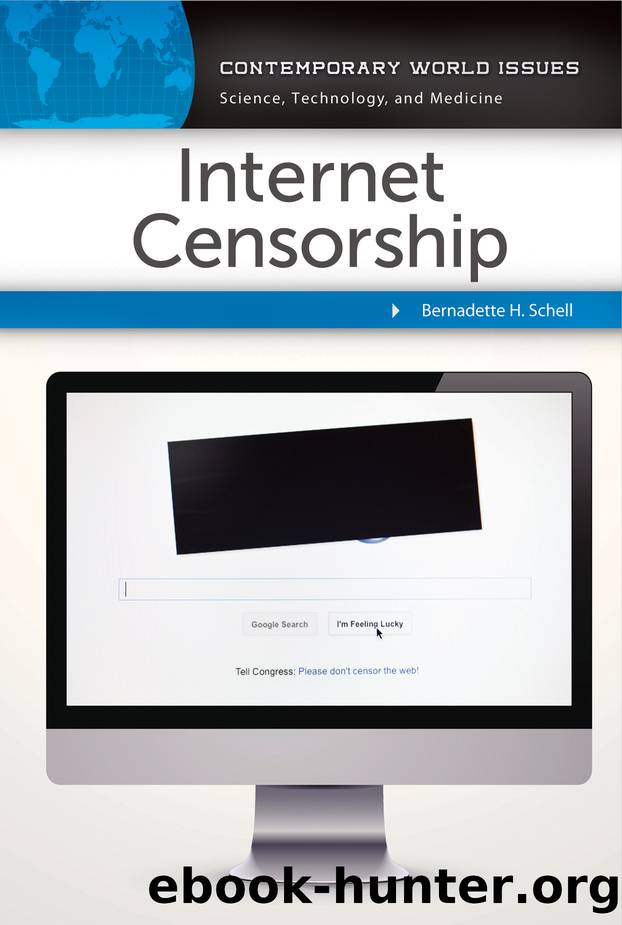Internet Censorship by Bernadette H. Schell

Author:Bernadette H. Schell
Language: eng
Format: epub
Publisher: ABC-CLIO
Published: 2014-11-15T00:00:00+00:00
The Problem for Internet Censorship
With the range of philosophical arguments existing within the spectrum between harmony and liberty, providing the legal and moral groundwork for Internet censorship shall be no easy task. The range and scope of the Internet presents a unique challenge to these classic arguments, a challenge not anticipated or assumed in the philosophical cannon that operated within an understanding of a cohesive and sovereign state. The central problem posed by the Internet toward arguments about censorship, then, is largely framed by the de-territoriality of the Internetâs accessibility by millions of users across the globe. State forces that in the past have at least ideologically facilitated the flow of information and power between citizen and state cannot easily legally and morally shape the audience who are the inheritors of information and services provided by Internet networks. The Internet both undermines and re-shapes traditional post-Westphalian boundaries that dominate the ostensible world in such a way that stretches the practical limitations of state laws. Philosophically speaking, the spectrum of the debate over censorship remains the provenance of ideologies and principles that work best in the contexts in a single sovereign stateâthat is, unchanged ideas in the great conversationâwith only subtle relevance to the practical development and implementation of rules and restrictions over the Internetâs pioneering spirit of intellectual frontier-ism. This is of course not to say that the philosophical representatives discussed in this section have no relevance to contemporary discussions about Internet censorship, but rather that we must be mindful of how our longest intellectual conversation about censorship can continue to provide the moral framework to uphold the values that we hold dear. Whether we think that censorship is helpful or harmful will depend largely on our moral and axiological standpoint. The purpose of this piece is to point out where it is that we have come from in our ideological thinking about censorship. It is hoped that an understanding of our philosophical underpinnings can guide our decisions regarding the Internet in the future.
Download
This site does not store any files on its server. We only index and link to content provided by other sites. Please contact the content providers to delete copyright contents if any and email us, we'll remove relevant links or contents immediately.
Kotlin in Action by Dmitry Jemerov(20569)
Grails in Action by Glen Smith Peter Ledbrook(17458)
Sass and Compass in Action by Wynn Netherland Nathan Weizenbaum Chris Eppstein Brandon Mathis(14871)
Configuring Windows Server Hybrid Advanced Services Exam Ref AZ-801 by Chris Gill(7530)
Azure Containers Explained by Wesley Haakman & Richard Hooper(7520)
Running Windows Containers on AWS by Marcio Morales(7070)
Microsoft 365 Identity and Services Exam Guide MS-100 by Aaron Guilmette(5452)
Microsoft Cybersecurity Architect Exam Ref SC-100 by Dwayne Natwick(5295)
Combating Crime on the Dark Web by Nearchos Nearchou(5053)
The Ruby Workshop by Akshat Paul Peter Philips Dániel Szabó and Cheyne Wallace(4728)
Management Strategies for the Cloud Revolution: How Cloud Computing Is Transforming Business and Why You Can't Afford to Be Left Behind by Charles Babcock(4573)
Ember.js in Action by Joachim Haagen Skeie(4356)
Python for Security and Networking - Third Edition by José Manuel Ortega(4301)
The Age of Surveillance Capitalism by Shoshana Zuboff(4292)
Learn Windows PowerShell in a Month of Lunches by Don Jones(4224)
Learn Wireshark by Lisa Bock(4195)
The Ultimate Docker Container Book by Schenker Gabriel N.;(3941)
DevSecOps in Practice with VMware Tanzu by Parth Pandit & Robert Hardt(3633)
Windows Ransomware Detection and Protection by Marius Sandbu(3605)
